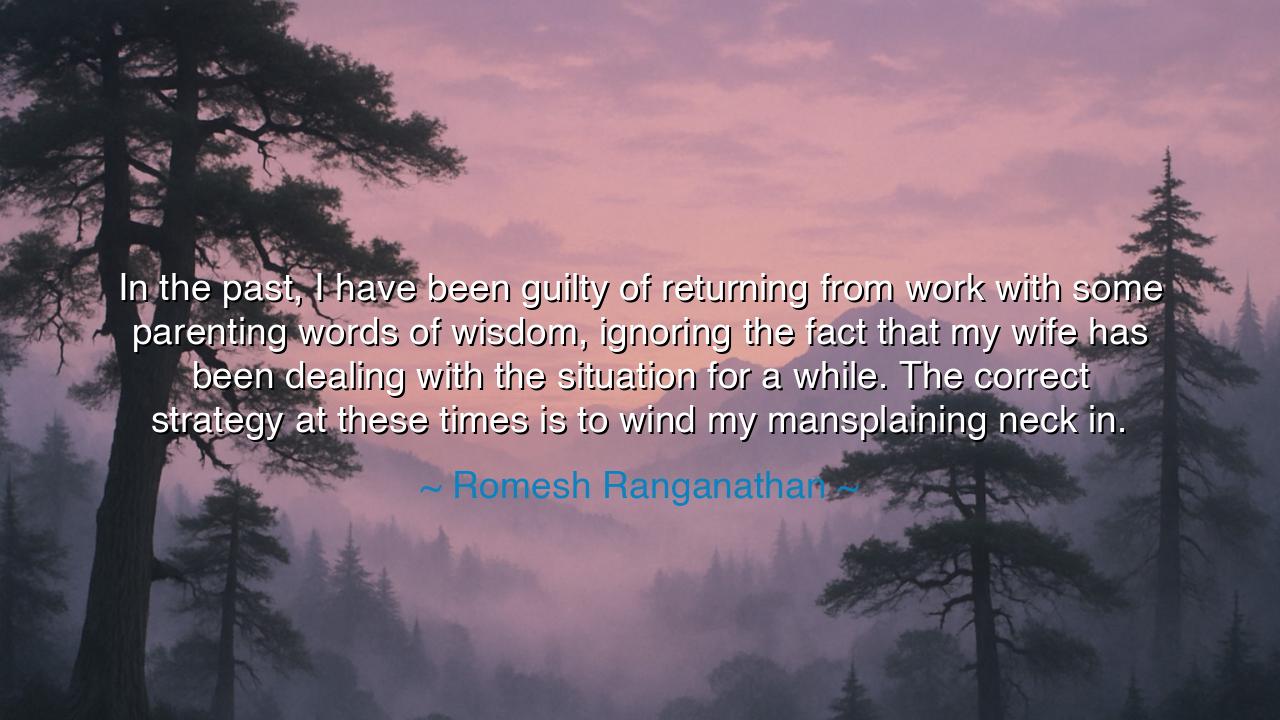
In the past, I have been guilty of returning from work with some
In the past, I have been guilty of returning from work with some parenting words of wisdom, ignoring the fact that my wife has been dealing with the situation for a while. The correct strategy at these times is to wind my mansplaining neck in.






Romesh Ranganathan, with the disarming honesty of one who has stumbled and chosen to laugh at his own folly, once confessed: “In the past, I have been guilty of returning from work with some parenting words of wisdom, ignoring the fact that my wife has been dealing with the situation for a while. The correct strategy at these times is to wind my mansplaining neck in.” In this simple yet striking admission lies a treasure of wisdom, not only about parenting, but about humility, partnership, and the delicate art of listening before speaking.
The origin of this truth rests in the daily rhythm of family life, where duties are not always equal, but always pressing. Ranganathan speaks as one who, after returning from the outer world of labor, was tempted to stride into the home as though he carried the solutions in his hand. Yet he realized that in doing so, he overlooked the silent strength of his wife, who had been wrestling with the day’s battles long before he entered the door. His words reveal a common failing of many—forgetting that wisdom is not earned by absence but by presence, and that those who carry the greater burden deserve not correction but recognition.
History provides us with vivid parallels. Consider Marcus Aurelius, the philosopher-emperor, who in his Meditations often rebuked himself for arrogance and reminded himself to honor those who labored alongside him. Though he ruled Rome, he acknowledged that true wisdom lay not in commanding every detail, but in humbling oneself before the unseen work of others. So too Ranganathan reminds us that the parent who presumes to “explain” without listening risks dishonoring the labor that has already been given in patience and love.
There is also in his confession a subtle heroism. To admit fault publicly, to laugh at one’s own pride, is not weakness but strength. Too often, men have believed that authority is their natural gift, that their words must always lead, even in the sacred work of parenting. But Ranganathan’s honesty tears away this illusion. By urging himself to “wind his neck in,” he models a new kind of leadership—one born not of dominance but of humility, not of speaking louder but of listening better.
His words also strike at the heart of partnership in family life. Parenting is not a stage upon which one parent enters to display wisdom while the other’s labor is ignored. It is a joint work, where mutual respect is the foundation. To dismiss the experience of one’s partner is to weaken the very bond that gives children their stability. But to recognize, honor, and share in that labor is to create a fortress of love in which children may flourish.
The lesson is clear: do not mistake absence for superiority. Do not presume that your voice, arriving late to the battle, carries greater weight than the one who has fought it all day. Instead, when you return, begin first with gratitude. Ask what has been done, honor the unseen sacrifices, and offer your strength not as command but as support. For in family, humility is the truest wisdom, and respect is the surest foundation.
Therefore, let Romesh Ranganathan’s words be carried forward: “The correct strategy at these times is to wind my mansplaining neck in.” They remind us that even in laughter, truth can shine brightly. To be a wise parent is not always to speak, but often to listen. To be a good partner is not to assume authority, but to recognize it already at work in the one beside you. And if we live by this lesson, then our families will not be ruled by pride, but guided by love and humility—the highest wisdom of all.






AAdministratorAdministrator
Welcome, honored guests. Please leave a comment, we will respond soon